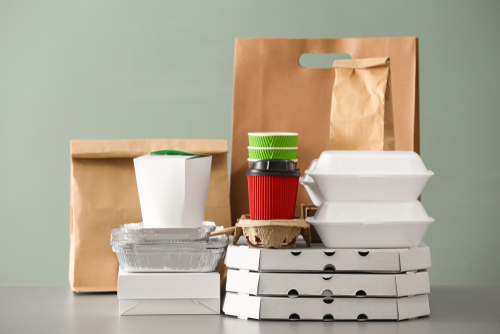In today's industrial and commercial world, the ability to stand out on the shelf while ensuring optimal protection and storage of products has become an absolute necessity.
Now more than ever, companies are looking for packaging solutions that meet not only the needs of the end consumer, but also logistical and operational requirements.
So let's analyze how the type of primary packaging influences the decision to choose the most suitable case packer for different needs.
Basic types of packaging and their characteristics
Today, packaging plays a key role not only in protecting products, but also in defining a brand's identity. Let's take a closer look at some of the most important types of packaging:
- Cartons: these are rigid packages often used for luxury or pharmaceutical products. They provide both good protection and excellent product presentation and require precise carton wrapping machines to ensure that the product is well protected and presented in the best possible way.
- Cans: these pressurized containers are often used for products such as deodorants, paints or in the food industry. The packaging of cans requires special care to ensure that the cans are not damaged and that the pressure remains intact.
- Doypacks: flexible packaging with a flat bottom that allows it to stand upright. Often used for food or liquids, doypack wrappers need to be able to handle their flexible format and ensure that the airtight seal remains intact.
- Flowpacks: three-sided sealed packages, often used for food products such as cakes or cookies. They require cartoners that can handle their thin format and ensure that the product remains fresh.
- Blocks: these packages are often used for products such as butter or margarine and are often made of aluminized paper or similar materials to maintain freshness. Block packaging machine must handle these packages carefully to maintain their integrity.
- Cans: these cylindrical metal packages are used primarily for beverages, but also for some foods. Cartoning cans requires secondary packaging machinery to protect them from damage and ensure they remain airtight.
These are just a few of the packages on the market today, but understanding the characteristics and needs of each type of package is critical to selecting the ideal cartoner.
The importance of case packers in modern times
In addition to the primary packaging type, it is necessary to evaluate the demands of the industry and the market. In fact, not all case packers are the same, and each industry has its own particular requirements:
Companies in the food sector need machines that ensure product integrity and compliance with health regulations.
In the consumer goods sector, the priority might be speed and flexibility to respond to changing market trends.
Companies in the beverage sector may need case packers that can handle bottles of different sizes and shapes, while those selling powdered products may need specialized systems to pack cartons or pouches.
These are just a few of the many considerations to keep in mind when choosing the ideal case packer.

How to choose the ideal case packer for each type of packaging
Once you've identified your specific packaging needs, it's time to explore the cartoner options available on the market. Here are some tips:
- Flexibility: a machine that can adapt to different package sizes and types can be a wise investment in the long run. For example, Zambelli Packaging's Model AP200W wrap-around case packer is versatile and can pack products such as plastic cans, bottles, tubs, tins, and other bulk items. A flexible machine can adapt to market changes, allowing companies to remain competitive without having to make additional investments in new equipment.
- Energy efficiency: energy-efficient machines can reduce operating costs. In addition, with a growing global focus on sustainability and the environment, owning energy-efficient packaging machinery can also enhance a company's reputation.
- Specificity: for more specific needs, it evaluates solutions created for specific types of packaging. For example, Zambelli Packaging offers the American RSC cartoner, ideal for the production of cartons, and the AP80 case packer, specialized for trays, doypacks and flowpacks. Choosing specialized machines for specific types of packaging ensures better quality and accuracy in case packing, reducing the possibility of errors or damage.
- Support and training: good after-sales support and operator training can make all the difference in day-to-day operations. Consider companies such as Zambelli Packaging that emphasize a detailed approach to respond accurately to different packaging needs. A well-trained and supported team not only ensures efficient operation, but can also reduce downtime and increase overall productivity.
By choosing carefully and keeping in mind the specifications of models like those offered by Zambelli, you can find the ideal cartoning machine for your needs.
Learn more about advanced case packing solutions and take a quantum leap in your production. Contact Zambelli Packaging for more information!